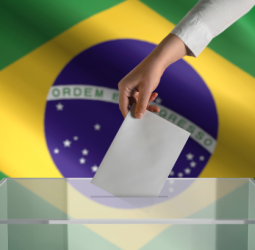The world's oldest democracy, Brazil, is set to hold its presidential elections on October 28, 2018. The elections have gained significant global attention due to the current political climate in the country and its potential impact on the global economy. As the election day draws near, here is all the latest news on the Brazilian elections.
The Current Political Scenario:
Brazil's current President, Michel Temer, assumed office in 2016 after the impeachment of Dilma Rousseff. Temer's administration has been embroiled in corruption scandals, causing widespread dissatisfaction among the Brazilian population. This dissatisfaction has led to the rise of far-right candidate Jair Bolsonaro, who is leading in the polls.
Bolsonaro's controversial statements and actions have sparked fear among many Brazilians, who fear a return to authoritarian rule. On the other hand, his supporters see him as a symbol of change and a solution to the country's economic and security issues.
The Other Contenders:
Besides Bolsonaro, there are several other candidates in the race for the Brazilian presidency. Fernando Haddad from the Workers' Party is the front-runner from the left-wing, while Marina Silva, a former environment minister, is also a contender. Geraldo Alckmin, a former governor of São Paulo, is also in the running, along with other candidates.
News from the Campaign Trail:
The election campaign has been filled with heated debates and clashes between candidates. Recently, Bolsonaro was stabbed during a campaign rally, causing public outrage and sparking discussions about the country's political climate. As Bolsonaro recovers from the attack, his opponents have called for a halt to the negative rhetoric that has characterized the campaign.
Meanwhile, Haddad has been gaining support from former President Luiz Inácio Lula da Silva, who was barred from running for the presidency due to his corruption conviction. This has led to a surge in Haddad's popularity, as he promises to continue Lula's policies.
Economic Concerns:
The Brazilian economy has been struggling in recent years, with high unemployment rates and slow growth. The outcome of the election is crucial for the economy, as different candidates have varying economic policies. Bolsonaro has promised to cut government spending and reduce state intervention in the economy, while Haddad plans to increase public spending and introduce more state control.
Impact on the Global Economy:
Brazil is one of the world's largest economies and a key player in global trade. Hence, the outcome of the election will have implications beyond the country's borders. Many international investors and businesses are closely monitoring the election and its potential impact on the economy.
Possible Scenarios:
With no clear front-runner, there is a possibility of a second round of voting if no candidate obtains more than 50% of votes in the first round. In this case, the two candidates with the most votes will compete in a run-off election on October 28.
Another possible scenario is a victory for Bolsonaro in the first round. As the current polls indicate, this could be a likely outcome. However, it is uncertain how his victory would sit with the Brazilian population and the global community.
Conclusion:
The Brazilian elections have the potential to bring about significant changes in the country's political and economic landscape. The outcome of the election will not only affect Brazilians but also have implications for the global economy. As the election day approaches, all eyes are on Brazil, and the world eagerly awaits the results.
The Current Political Scenario:
Brazil's current President, Michel Temer, assumed office in 2016 after the impeachment of Dilma Rousseff. Temer's administration has been embroiled in corruption scandals, causing widespread dissatisfaction among the Brazilian population. This dissatisfaction has led to the rise of far-right candidate Jair Bolsonaro, who is leading in the polls.
Bolsonaro's controversial statements and actions have sparked fear among many Brazilians, who fear a return to authoritarian rule. On the other hand, his supporters see him as a symbol of change and a solution to the country's economic and security issues.
The Other Contenders:
Besides Bolsonaro, there are several other candidates in the race for the Brazilian presidency. Fernando Haddad from the Workers' Party is the front-runner from the left-wing, while Marina Silva, a former environment minister, is also a contender. Geraldo Alckmin, a former governor of São Paulo, is also in the running, along with other candidates.
News from the Campaign Trail:
The election campaign has been filled with heated debates and clashes between candidates. Recently, Bolsonaro was stabbed during a campaign rally, causing public outrage and sparking discussions about the country's political climate. As Bolsonaro recovers from the attack, his opponents have called for a halt to the negative rhetoric that has characterized the campaign.
Meanwhile, Haddad has been gaining support from former President Luiz Inácio Lula da Silva, who was barred from running for the presidency due to his corruption conviction. This has led to a surge in Haddad's popularity, as he promises to continue Lula's policies.
Economic Concerns:
The Brazilian economy has been struggling in recent years, with high unemployment rates and slow growth. The outcome of the election is crucial for the economy, as different candidates have varying economic policies. Bolsonaro has promised to cut government spending and reduce state intervention in the economy, while Haddad plans to increase public spending and introduce more state control.
Impact on the Global Economy:
Brazil is one of the world's largest economies and a key player in global trade. Hence, the outcome of the election will have implications beyond the country's borders. Many international investors and businesses are closely monitoring the election and its potential impact on the economy.
Possible Scenarios:
With no clear front-runner, there is a possibility of a second round of voting if no candidate obtains more than 50% of votes in the first round. In this case, the two candidates with the most votes will compete in a run-off election on October 28.
Another possible scenario is a victory for Bolsonaro in the first round. As the current polls indicate, this could be a likely outcome. However, it is uncertain how his victory would sit with the Brazilian population and the global community.
Conclusion:
The Brazilian elections have the potential to bring about significant changes in the country's political and economic landscape. The outcome of the election will not only affect Brazilians but also have implications for the global economy. As the election day approaches, all eyes are on Brazil, and the world eagerly awaits the results.
You Must be Registered Or Logged in To Comment Log In?



 politics live casino
politics live casino
















